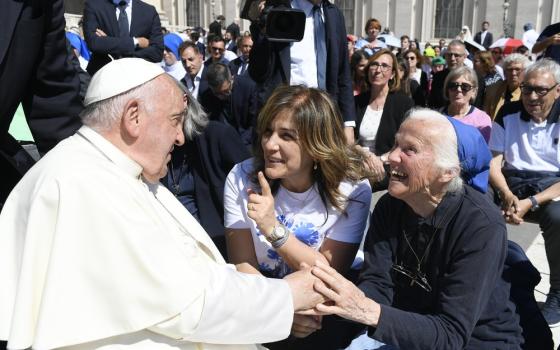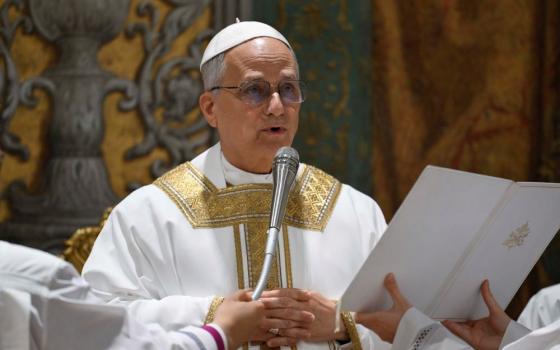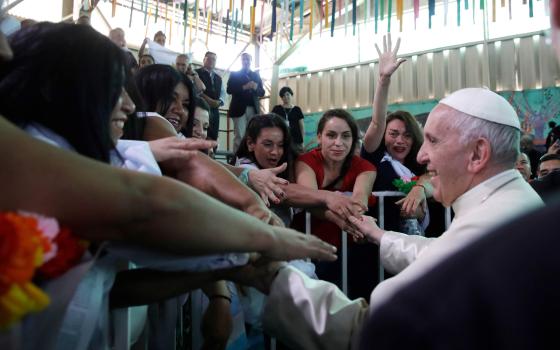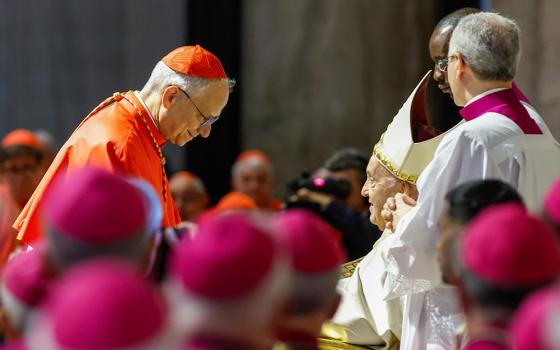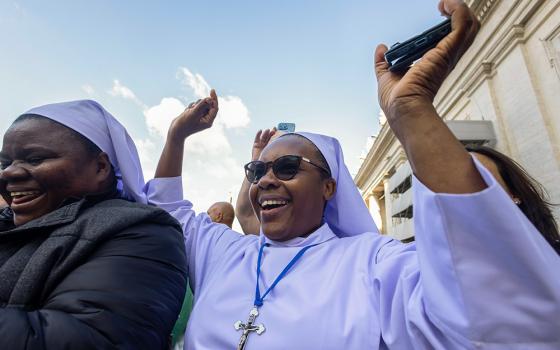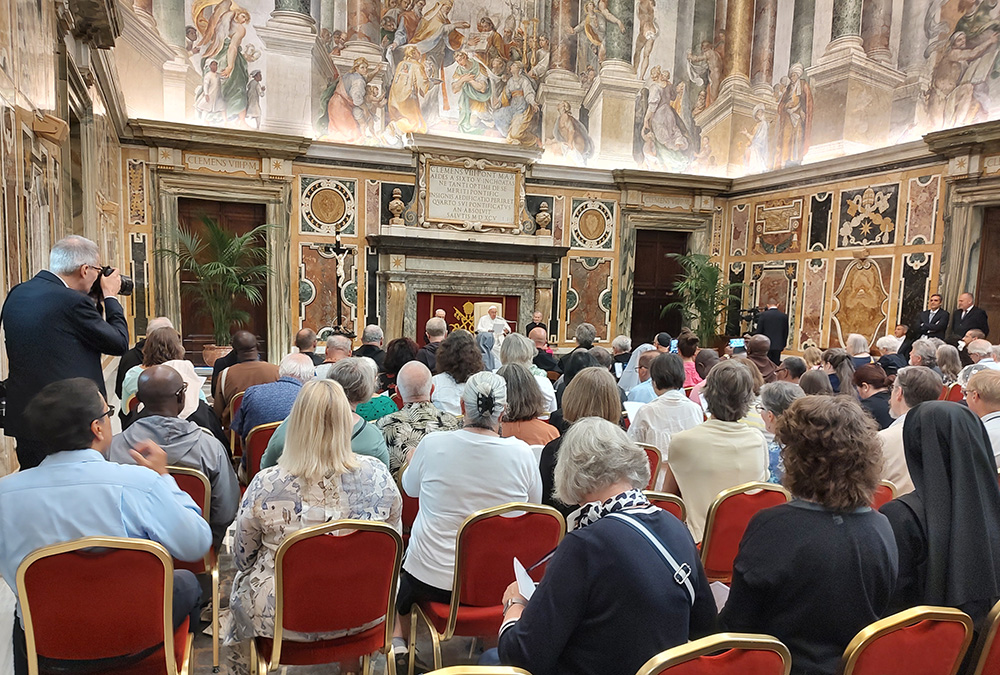
Pope Francis delivers his address to the delegates of the Fifth World Congress of Benedictine Oblates in the Clementine Hall at the Vatican. (Julie A. Ferraro)
It is my hope to be forgiven for paraphrasing Psalm 84:11 for, in my own case, "A day in the Irish countryside is better than a thousand elsewhere."
On Sunday morning, Sept. 17, I stood outside the farmhouse which is the temporary monastery of the Benedictine Sisters at Kylemore Abbey, basking in the silence and watching low clouds float across the mountaintops. I felt a peace like I felt nowhere else in the world.
And I thank the sisters for their hospitality and for making that possible.
The previous eight days — 10, if you count travel — had been very intense. Honored to be representing the Monastery of the Ascension, Jerome, Idaho, as their delegate to the Fifth World Congress of Benedictine Oblates, I arrived at the Collegio Sant'Anselmo on Sept. 9, finding temperatures in the 90s and no air conditioning. The oblates from 25 countries and more than 80 monasteries made up for that inconvenience.
The morning and evening prayers, as well as Mass, were mostly in Latin. However, they featured Scripture readings and petitions in a different language each day: French, Italian, Portuguese, Spanish, German and English. Translators were available to make the keynote presentations accessible.
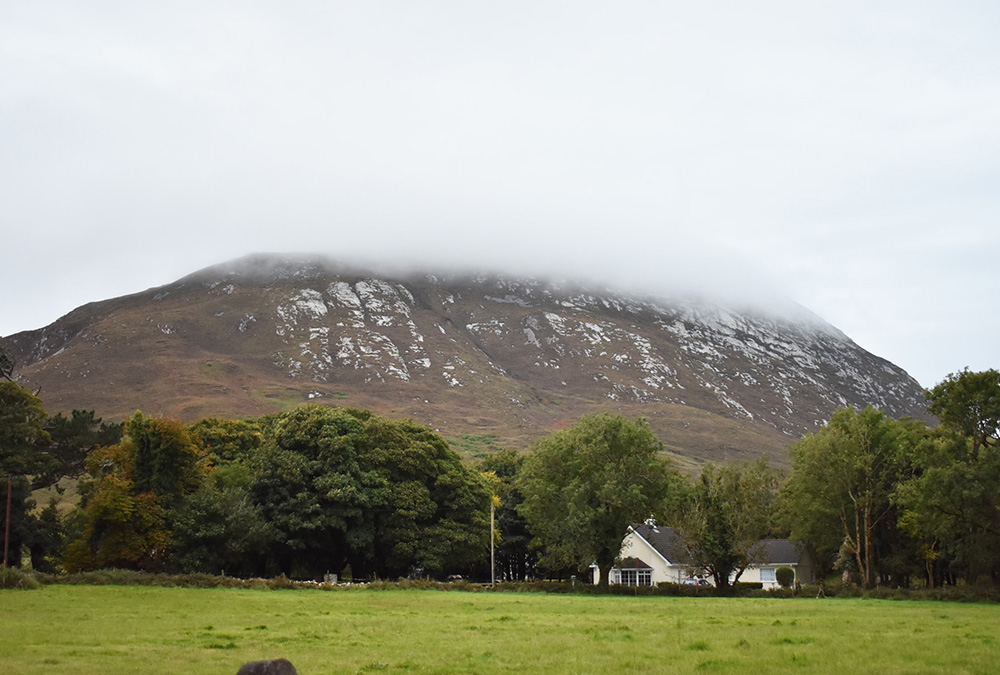
A peaceful Irish scene in the Irish countryside, outside the farmhouse which is the temporary monastery of the Benedictine Sisters at Kylemore Abbey (Julie A. Ferraro)
Aligned with the theme "Moving Forward: Living the Wisdom of the Rule," Benedictine Sr. Marie-Madeleine Caseau, prioress of St. Bathilde of Vanves monastery in France, spoke in French about the importance of formation — initial and ongoing — for all oblates, and all Benedictines. She called on the oblates to be "Benedictine bees" by gathering the pollen of knowledge and experience, taking it back to the hive, and then creating the honey of wisdom to be shared with others.
Benedictine Abbot Donato Ogliari, abbot of the Abbey of St. Paul Outside the Walls in Rome, followed later in the week with his insights on how oblates can evangelize, especially to the younger generation. Touching on aspects of discretion, silence and humility as detailed in the Rule of St. Benedict, he proposed that oblates be St. Benedict for today's world.
Abbot Primate Gregory Polan, who entered Conception Abbey in Missouri and previously served as abbot there before moving to Rome, added his thoughts to the process. He called on the oblates to be ambassadors of peace and reconciliation while expanding the mission of our monasteries as the 21st century continues.
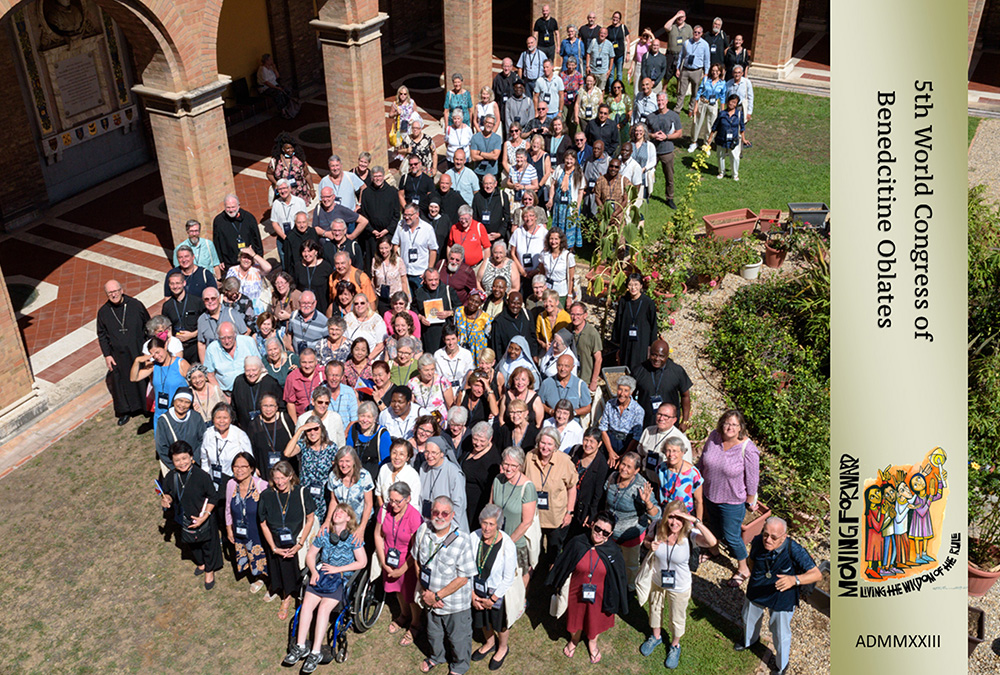
The delegates and organizers of the Fifth World Congress of Benedictine Oblates gathered in the courtyard at Collegio Sant'Anselmo in Rome for a group photo. (Courtesy of Fifth World Congress of Benedictine Oblates)
In addition, a three-part presentation titled "Islands of Silence" offered oblates the chance to deepen their understanding of silence in their lives. Those sessions alternated with interactive workshops, during which the oblates shared what they had learned from the keynotes and discussed ways their monasteries currently — or in the future — will continue to evolve Benedictine spirituality.
Two other events expanded the oblates' knowledge of Benedictine history. First, journeys to Monte Cassino monastery, founded by St. Benedict, accidentally bombed by Allied forces during World War II in 1944, and then painstakingly restored. Then, visits to the Sacro Speco (St. Benedict's "holy cave") in Subiaco. It is impossible to convey the beauty of those sites, the spirit, the history, and each oblate told of different experiences beyond the tours.
Travel, however, was slow and tedious.
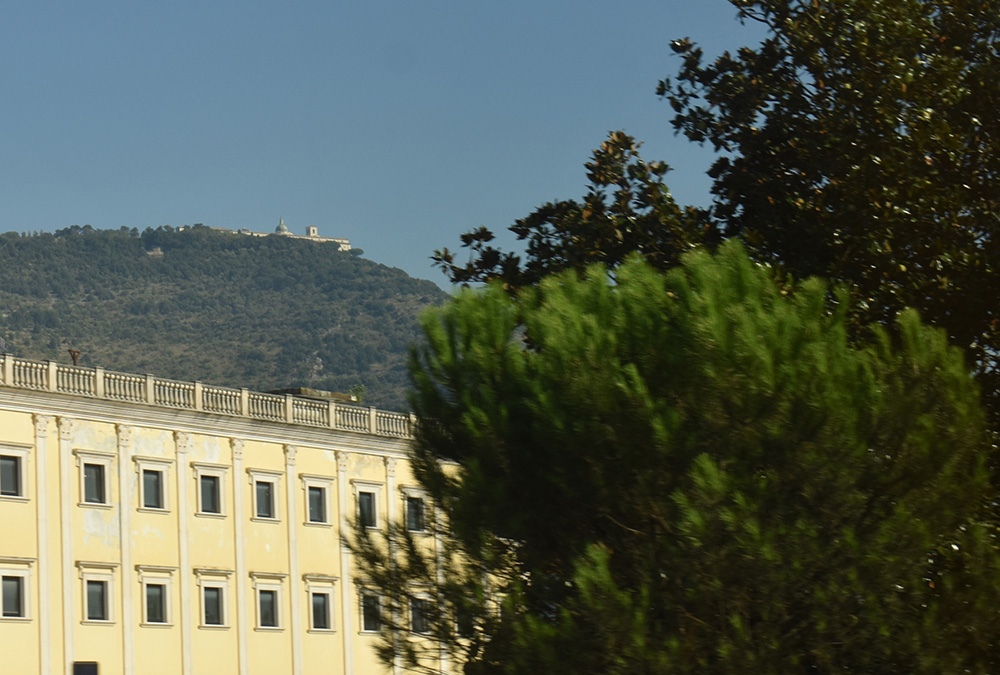
Pulling off the highway, the delegates to the Fifth World Congress of Benedictine Oblates could see Monte Cassino high on the mountain. (Julie A. Ferraro)
On Thursday evening, a group of very talented musicians performed a "mini-concert" of 17th-century sacred music, including the first modern performance of a motet titled "O Beate Benedicte" composed by Alessandro Grandi. The acoustics of the abbey church lent itself well to the beautiful voices and stringed instruments — including the theorbo (a medieval, long-necked version of a guitar, with almost the same tuning, according to Stefano Todarello, who played it).
The last full day of the congress, the oblates boarded buses for the Vatican, embarking on a slow and tedious meandering through busy streets. In Rome, the shortest distance between two points is never a straight line — and it often leads uphill!
Ushered through St. Peter's security checkpoint, we climbed around 200 steps (I admit to panting and gasping) to the Clementine Hall for a private audience with Pope Francis. In his address — given in Italian, but provided to us in English — he noted "three aspects of this 'expansion of the heart': the search for God, enthusiasm for the Gospel and hospitality."
Advertisement
Pope Francis pointed out that oblates should live in contrast to society, which seems to be "slowly suffocating in the locked vaults of selfishness, individualism and indifference."
After blessing us, he took the time to shake hands with each of the oblates, all while the Vatican's official photographer snapped away. Commonly seen with my Nikon around my neck throughout the week, I hoped he had a large capacity memory card, given how swiftly his shutter was clicking.
That evening, Polan commissioned us to return to our monasteries and share what we'd learned. For me, making connections with oblates from other parts of the U.S., Australia, Africa and England — there wasn't time to interact with everyone! — will linger with me for a long time.
And, for the November oblate retreat in Jerome, I'll be giving a presentation about the ideas that bloomed at the congress, such as holding regional oblate meetings in the Americas, while others take place in Europe, Asia and so forth. That way, concerns, ideas or needs can be shared and then brought to the next world congress more effectively.
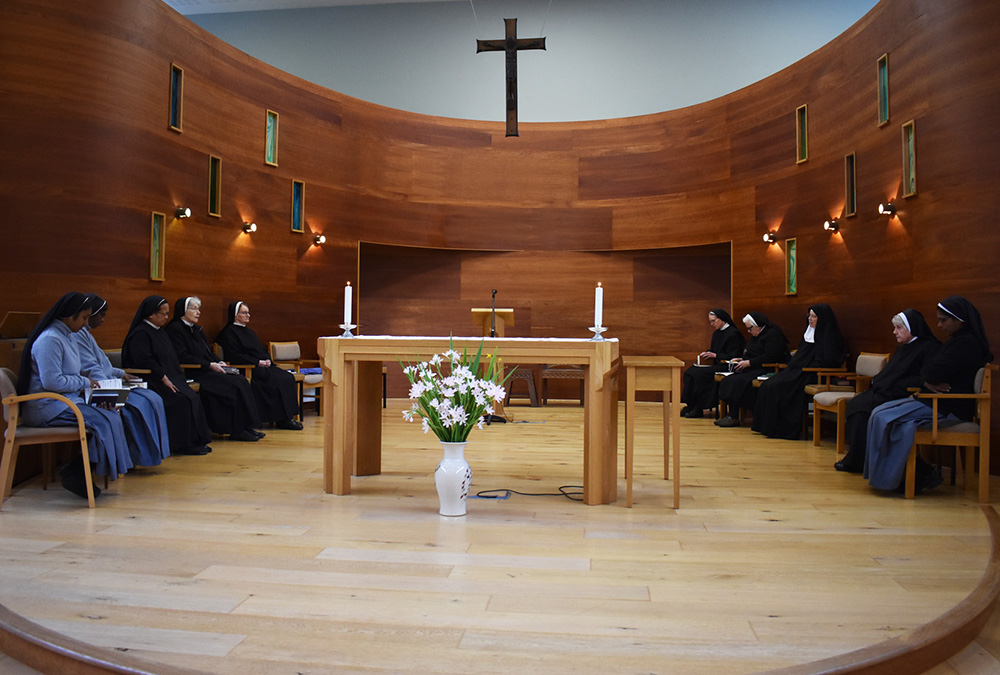
The Benedictine Sisters of Kylemore Abbey gather for morning prayer in their chapel. (Julie A. Ferraro)
Adding the environment/stewardship as a fifth pillar to the four adapted from St. John Paul II's pillars of priestly formation for oblates (humanity, communal, spiritual, intellectual) —especially since many oblates are already quite involved in working to save the planet — is another concept.
So, why then, was my single day in Ireland so vital to me? Besides my natural affinity for the island and its culture, after enduring the nearly constant harangue of Roman sirens, the noise and the oppressive heat and humidity, I needed the silence of that Sunday morning. I stood still near a field where two horses grazed while trickling water from a stream provided its own concert. I studied interesting formations of moss on a stone fence, all to appreciate that the discomfort I endured during a hectic seven days will hopefully bear fruit — not only for myself, but for the 150 delegates and the oblate communities with whom they share what they have learned — moving the entire Benedictine family forward.
I (accidentally) left my walking stick in the cozy cottage where I stayed. I leave it without regret, knowing I took with me the much more valuable peace I found there.

